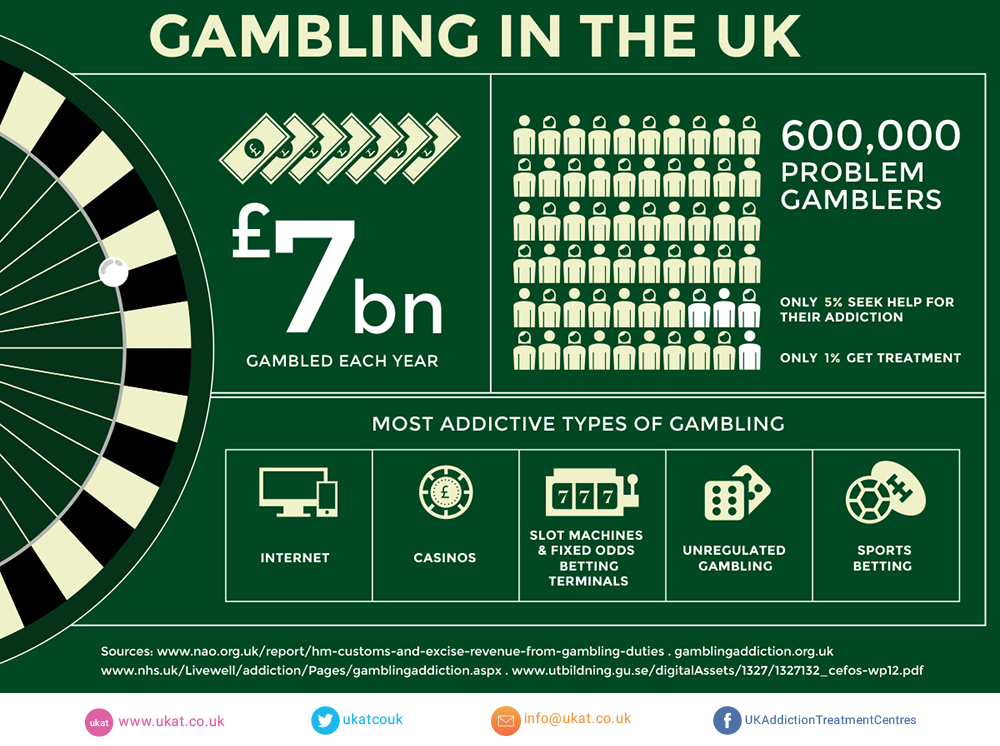Gambling Treatment
The full training series exceeds the Oregon requirement of 10-hours training for qualified mental health or substance abuse clinical supervisors who supervise problem gambling counselors. Counselors may use any two modules (totaling 3 continuing education units) to meet the problem gambling education requirements for certification by the Mental Health and Addiction Certification Board of Oregon as a Certified Alcohol and Drug Counselor. Practitioners seeking continuing education units are welcome to access as many modules as they would like to deepen their knowledge of problem gambling treatment.
- Craig is a certified gambling treatment provider. At Club Recovery, we provide both individual and group therapy for people with a gambling disorder, as well as family therapy and interventions. We welcome all people who are seeking help to address their problems and would like support to begin making positive changes in their life.
- Gambling treatment in a nutshell. Learn more about Martin at his website (we talked about guilt a while back), and learn more about Martin’s talk and the Moments of Meaning project at our.
- If you or a loved one struggle with a gambling problem, there is hope. Whether you cannot seem to stop casino gambling in Atlantic City or betting on fantasy sports from the comfort of your home, treatment and support are readily available. The Council on Compulsive Gambling of New Jersey (CCGNJ) has helped countless people recover from disordered gambling since its inception.
- Feb 01, 2021 The judge behind Nevada's Gambling Treatment Diversion Court program spoke on Craig Carton's show about the need for a similar plan in NJ.
Everyone is welcome to complete all modules. Once you register, you will see that we have identified those modules we believe will be most helpful for three primary audiences: New Problem Gambling Counselors, Problem Gambling Administrators and Clinical Supervisors, and Behavioral Health Professionals interested in learning more about problem gambling treatment.

Problem gambling treatment programs must be licensed by IDPH and are selected for contracting through a competitive request for proposals process. If you are looking for counseling, prevention, or educational services regarding problem gambling, click here and select 'Problem Gambling Treatment' and then select your county to find a provider.
Registration
Problem Gambling Treatment modules are offered free of charge, including the verification of 1.5 continuing education units per module (Problem Gambling Assessment and Treatment Planning earns 2 CEUs).
Steps to Register:
- Begin your registration using the button below, and submit the online form to activate your Moodle account (the program that contains the modules).
- You will receive an email from our Information Technology office with links and instructions for accessing the training modules. (Please allow up to 5 business days for this process.)
Once you have gained access, you can choose to complete any number of the 9 modules. Your Moodle account will be active for one year. View our Moodle FAQ here
Questions about registration? Please contact us at 503-768-6040 or cce@lclark.edu
Training Module Descriptions

Problem Gambling Treatment in Oregon: The Big Picture
Offers a broad overview of providing problem gambling treatment in Oregon. Module participants will learn about the state administrative structure, as well as treatment and documentation requirements.
Recommended For: Anyone directly involved in providing problem gambling treatment in Oregon, including but not limited to: Problem Gambling Treatment Providers (CGAC’s), Supervisors, Agency Administrators
Overview of Problem Gambling
Offers a historical overview of problem gambling, along with information about contemporary gambling technology. Presenters will discuss the ways problem gambling behaviors can develop, key indicators to watch for when determining if gambling is becoming a problem, and treatment implications to consider.
Recommended For: All Mental Health Clinicians, Substance Abuse and Addiction Counselors (CADCs), Problem Gambling Treatment Providers (CGAC’s), Problem Gambling Treatment Supervisors, and Prevention Specialists.
Initial Engagement in Problem Gambling Treatment
Examines how to engage those seeking help for problem gambling and use motivational interviewing to explore stages of, and readiness for, change.
Recommended For: All Mental Health Clinicians, Substance Abuse and Addiction Counselors (CADCs), Problem Gambling Treatment Providers (CGACs), Problem Gambling Treatment Supervisors, and Prevention Specialists.

Problem Gambling Assessment and Treatment Planning
Includes information on how to: Complete an initial problem gambling assessment and treatment plan; Address the ‘dream world’ with clients; identify community support for recovery; and how to refer a client to inpatient treatment.
Recommended For: All Mental Health Clinicians, Substance Abuse and Addiction Counselors (CADCs), Problem Gambling Treatment Providers (CGAC’s), Problem Gambling Treatment Agency Administrators and Supervisors.
Treatment For Gambling Addiction
Diversity, Social Equity and Problem Gambling
Considerations on the relationship between culture, social equity and gambling. Presenters explore the impact of social location (e.g., race, gender, age and sexual orientation) on problem gambling, along with the need for culturally specific problem gambling treatment.
Recommended For: All Mental Health Clinicians, Substance Abuse and Addiction Counselors (CADCs), Problem Gambling Treatment Providers (CGAC’s), Problem Gambling Treatment Supervisors, Agency Administrators and Prevention Specialists.
Problem Gambling and Money
Explores the meaning of money for those who struggle with problem gambling. Presenters share how to explore money in problem gambling treatment, and how to best assist clients with money management (establishing money barriers, developing budgets).
Recommended For: All Mental Health Clinicians, Substance Abuse and Addiction Counselors (CADCs), Problem Gambling Treatment Providers (CGAC’s), Problem Gambling Treatment Supervisors, and Prevention Specialists.
Family Treatment for Problem Gambling
Offers an overview of the impact of problem gambling on the family, the family’s role in treatment, and ethics specific to family work. A family therapist demonstrates how to work with family members during the early stages of problem gambling treatment.
Recommended For: All Mental Health Clinicians, Substance Abuse and Addiction Counselors (CADCs), Problem Gambling Treatment Providers (CGAC’s), Problem Gambling Treatment Supervisors, and Prevention Specialists.
Problem Gambling Treatment: Supervision Part I
Addresses the need for supervisors to acquire specific education in problem gambling in order to confidently and adequately guide a patient’s treatment. This includes administrative tasks such as gathering and submitting the paperwork required for state-funded problem gambling treatment programs.
Recommended For: Problem Gambling Treatment Supervisors and Agency Administrators.
Gambling Treatment Centre
Problem Gambling Treatment: Supervision Part II
Builds upon the learning in Problem Gambling Treatment: Supervision Part I by exploring gambling counselor identity, problem gambling treatment evaluation, and particular ethical issues that may arise in problem gambling treatment.
Recommended For: Problem Gambling Treatment Supervisors and Agency Administrators.